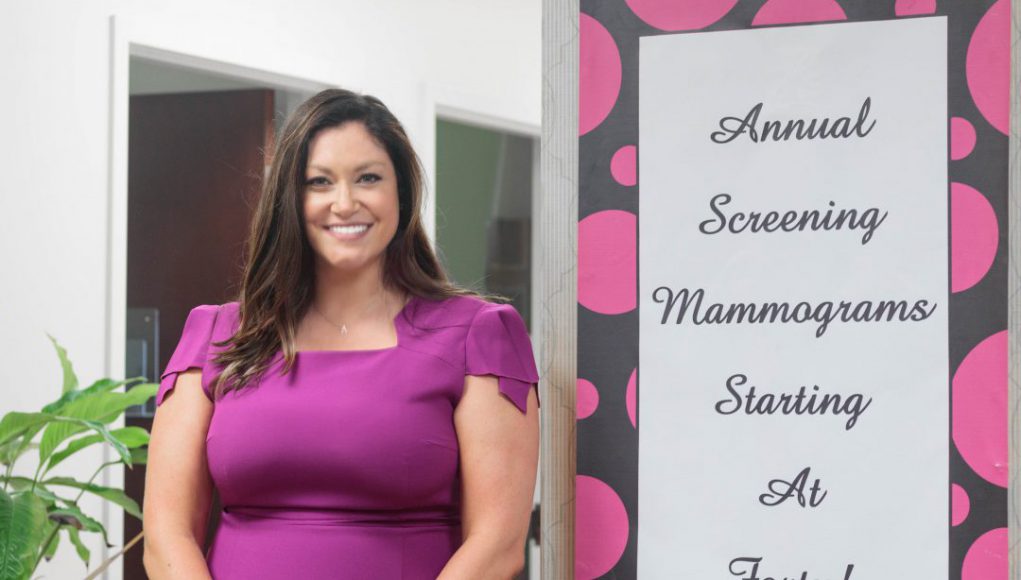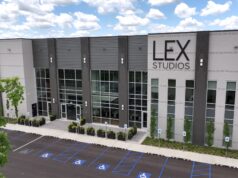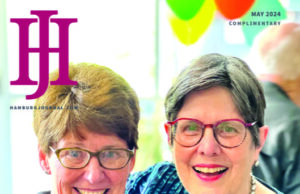SPONSORED FEATURE
A Tête à Tête with Dr. Andrea Colton, MD, MPH
At the forefront of a wide spectrum of women’s health matters, none are more ubiquitous during the fall as breast health and breast cancer. This is a subject Dr. Andrea Colton, MD, MPH of Lexington Clinic knows all about.
Dr. Colton is the only fellowship trained breast surgical oncologist in the city and helps give women with this disease a fighting chance.

We had the pleasure of sitting with Dr. Andrea Colton at Lexington Clinic Center for Breast Care, talking about breast health and Think Pink!
Q: Tell us a little about yourself.
A: I began my career by getting my Bachelor of Science at the University of Kentucky and completing my internship at Einstein Memorial Medical Center. I went to Conemaugh Memorial Medical Center in Pennsylvania to complete my residency, and I finished my fellowship at the University of Texas Southwestern in Breast Surgical Oncology, specializing in Breast Surgery.
I care for both malignant and benign breast disease processes. I perform nipple sparing mastectomy, skin sparing mastectomy and partial mastectomies with oncoplastic techniques.
Q: What brought you to the field of medicine?
A: It was in third grade when my grandfather faced some serious health concerns and I became intrigued by the medical field. As I visited him in the hospital, that’s when I knew I wanted to be a surgeon.
It was during my residency that I knew I wanted to become a Breast Surgeon. I rotated through various surgical programs, but gravitated towards breast surgery.
Q: Talk to us about some of the cutting-edge procedures that you do?
A: Sure. The first is Localization. When a malignant mass or calcification is detected, I go in and place a Radio Frequency Identification Tag (RFID Tags). This technology allows me to find exactly the precise location within the breast that I want to remove. So instead of using a wire to find the mass, a small object is placed in that area and is FDA-approved to stay in the body indefinitely. This device makes it easier for me to find that location in future exams and to know where to look for other possible masses. It can also reduce the incidence of patients needing to return to the O.R.
 Having identified the target area, we can then direct the chemotherapy to a specific spot in hopes of killing all cells. If the cancer cells are eliminated, the need for additional surgeries is significantly reduced.
Having identified the target area, we can then direct the chemotherapy to a specific spot in hopes of killing all cells. If the cancer cells are eliminated, the need for additional surgeries is significantly reduced.
The second procedure is Biozorb. This allows radiologists to see precisely where the cancer once was and allows the radiation oncologist to give patients more precise radiation whenever they undergo whole breast radiation with the boost.
Another cutting-edge process employed at Lexington Clinic’s Center for Breast Care is Kubtec technology. It’s a 3-D mammogram machine that essentially does tomosynthesis and provides a scan of the breast tissue, similar to a CT Scan. The picture slices it from top to bottom with one-millimeter slices, which allows me to look at each slice individually. This allows me to identify things more easily and be more precise in patient procedures.
Q. What do you like about your job?
A: The best part of my job is when patients come to me after their surgery and I can tell them that ‘You are a SURVIVOR’….that’s the best feeling. I’m also a hugger….I love getting to know my patients personally and being there for them through their journey.
 Q: How important are mammograms for women?
Q: How important are mammograms for women?
A: Mammograms are extremely important. Breast cancer does not always appear as a lump, and the cancers that are found on routine screening are much smaller on average than cancers that are discovered in women who do not participate in regular screening, and only see their doctor once they have developed a breast lump.
Q: What is the one myth about mammograms that you’d like to dispel?
A: One common misconception I hear often is that mammograms aren’t necessary unless there is an issue or you discover a lump. We need all women to do their mammograms by the age of 40 and for mammograms to become part of their regular screenings there after. While the majority of Center for Breast Care patients are those with breast cancer, patients here are also treated for a variety of breast health concerns, including benign lumps, breastfeeding issues, skin changes, and more.
 In talking with Dr. Colton about the pioneering technologies and procedures underway at Lexington Clinic Center for Breast Care, now more than ever, Central Kentucky is poised to bring awareness to the disease and in the fight against breast cancer – and to pack a serious punch.
In talking with Dr. Colton about the pioneering technologies and procedures underway at Lexington Clinic Center for Breast Care, now more than ever, Central Kentucky is poised to bring awareness to the disease and in the fight against breast cancer – and to pack a serious punch.
SUPPORT
The Center for Breast Care hosts a regular support group once a month for those with breast cancer. They meet on the second Tuesday of each month from 6:30 p.m. until 8 p.m. For more information, call 859.258.4932.
This material has been provided by Lexington Clinic for informational purposes only.
____________________________________________________________________
This article also appears on page 10 of the October 2019 print edition of Hamburg Journal.
For more Lexington, KY, Hamburg area news, subscribe to the Hamburg Journal digital newsletter.
To advertise in Hamburg Journal, call 859.268.0945












